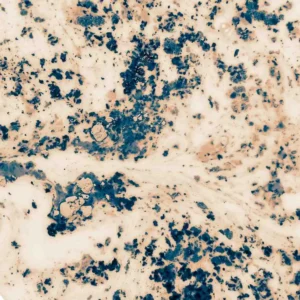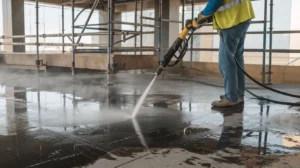When selecting the perfect countertop for your kitchen or bathroom, the porosity of the material is a critical factor to consider. Porosity affects everything from durability to maintenance, influencing the overall functionality of your countertop. So, is marble porous compared to other popular countertop materials? Let’s dive into this comparison, examining marble alongside quartz, granite, and limestone to help you make an informed decision.

Porosity of Countertop: Marble vs. Quartz vs. Granite vs. Limestone
Porosity refers to the presence of small pores within a material, which can absorb liquids and harbor stains. The porosity of a countertop determines how susceptible it is to staining, how much maintenance it requires, and its overall lifespan. Here’s a closer look at how marble, quartz, granite, and limestone compare in terms of porosity.
Marble
Marble is a natural stone celebrated for its timeless beauty and classic appeal. However, the question is, Is marble porous?. Often arises when homeowners consider it for countertops. The answer is yes—marble is indeed porous. This characteristic can be both a blessing and a curse, depending on how you plan to use your marble countertop.
The porous nature of marble means that it can easily absorb liquids, making it susceptible to stains. This is particularly true for substances like wine, coffee, and acidic liquids such as lemon juice. White marble, especially Carrara marble countertops, is more prone to showing stains, so extra care is needed to keep them looking pristine.
The small pores in marble can trap liquids and cause discoloration, which can be challenging to remove once they set in. On the other hand, the porosity of marble also gives it a unique, natural look that many homeowners find appealing. The veins and patterns in marble are often accentuated by its porous surface, giving each slab a one-of-a-kind appearance.
While marble is porous and requires more maintenance than other materials like quartz, its aesthetic appeal makes it a popular choice for those who want a luxurious and elegant countertop.
Quartz
Quartz countertops are engineered stone surfaces, made by combining natural quartz with resins and pigments. One of the standout features of quartz countertops is their non-porous nature. Unlike natural stones, quartz does not have small pores, making it resistant to stains and highly durable.
The non-porous surface of quartz means that it doesn’t absorb liquids, so you don’t have to worry about spills seeping into the countertop and causing stains. This characteristic makes quartz a popular choice for kitchen countertops, especially in areas prone to spills, like around sinks and cooking areas.
Quartz is also resistant to acidic substances like lemon juice, which can be a concern with more porous materials like marble. If you’re looking for a countertop surface that requires minimal maintenance and is easy to clean, quartz might be the ideal choice.
Granite
Granite is a natural stone that is renowned for its beauty and strength. It’s often chosen for its unique patterns and color variations, which can add a touch of elegance to any kitchen or bathroom. However, granite is porous, meaning it has small pores that can absorb liquids and become susceptible to stains.
The porosity of granite can vary depending on the specific type and finish. While it’s generally less porous than marble, it still requires regular sealing to maintain its resistance to stains and damage.
Granite countertops are durable and can withstand heavy use, but their porous nature means that they need proper care and maintenance to keep them looking their best. If you’re considering granite marble countertops, it’s essential to keep this in mind and be prepared for the upkeep required to handle its porous nature.
Limestone
Limestone is another natural stone that is often used for countertops, particularly in more rustic or traditional designs. Like marble, limestone is porous and can absorb liquids, making it susceptible to stains. The porous surface of limestone means that it requires regular sealing and careful maintenance to keep it looking its best.
Limestone’s porous nature makes it more delicate than other stone materials like granite and quartz. It can be easily scratched or chipped, and it is also more prone to staining from acidic substances. For these reasons, limestone countertops are best suited for areas that don’t experience heavy use, such as bathrooms or decorative surfaces.
If you love the look of limestone and are willing to invest in the maintenance it requires, it can be a beautiful addition to your home. However, it’s essential to handle limestone’s porosity with care to ensure it remains in good condition over time.
Is Porous Marble Right for You?
When considering whether porous marble is the right choice for your countertop, it’s important to weigh the pros and cons. Marble offers a timeless and elegant look that is unmatched by other materials. Its natural veining and patterns can make any kitchen or bathroom look sophisticated and luxurious.
However, its porous nature means that it requires more maintenance than non-porous materials like quartz. If you’re considering Carrara marble or another type of marble for your kitchen, it’s crucial to understand that it will be more susceptible to stains and damage than other countertop materials. The small pores in marble can absorb liquids, leading to discoloration and the potential for permanent stains if not properly cared for.
That said, many homeowners are willing to take on the maintenance required for marble countertops because of their beauty and unique characteristics. If you’re prepared to seal your marble regularly, clean up spills immediately, and avoid using harsh or acidic cleaners, marble can be a stunning and functional choice for your countertop.
Conclusion
In the debate over Is marble porous?. The answer is clear: Yes, marble is porous, and so are other natural stone materials like granite and limestone. While the porosity of these materials can make them more challenging to maintain, their natural beauty and unique characteristics often outweigh the drawbacks.
Quartz, on the other hand, offers a non-porous alternative that is resistant to stains and easy to maintain. If low maintenance is your priority, quartz might be the best choice for your countertop. However, if you’re drawn to the timeless elegance of marble, granite, or limestone, understanding and accepting their porous nature is key to enjoying these materials in your home.
Ultimately, the right countertop material for you will depend on your lifestyle, maintenance preferences, and aesthetic tastes. Whether you choose a non-porous surface like quartz or embrace the natural beauty of a porous stone, with proper care, your countertop can be a stunning and functional addition to your home. Transform your space with our expert services contact us if you have any query or want to take our services.






